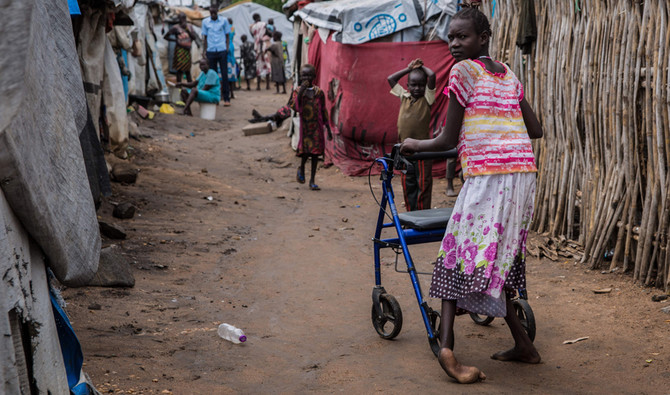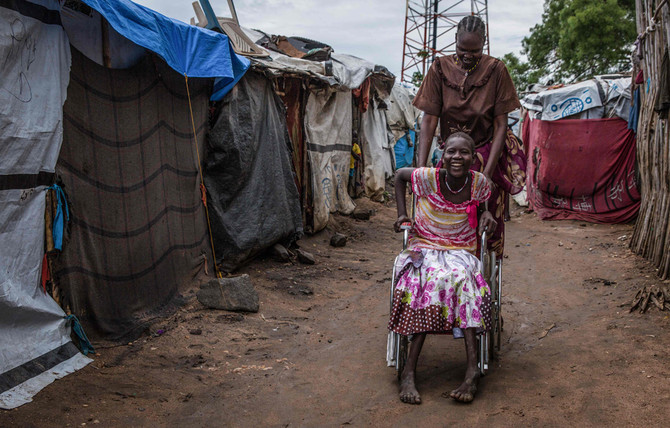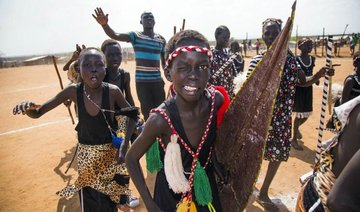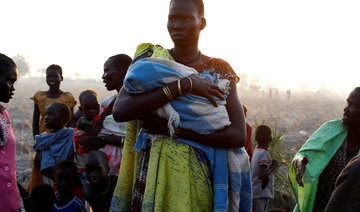JUBA, South Sudan: There is no shortage of victims in South Sudan’s civil war. But few suffer more than the handicapped.
Nyamet was seven years old when soldiers attacked her town.
Most of the population had hurriedly left, abandoning the elderly, blind and disabled — like Nyamet, afflicted by cerebral palsy — to the mercy of the armed men.
They showed none.
“They killed them,” said Nyamet’s mother, who had remained behind with her daughter. “That’s when we started running,” she added, recalling how she fled with the child in her arms.
Four years later, the family lives in a squalid, congested camp for over 7,000 of South Sudan’s millions of uprooted, in the capital Juba.
Nyamet spends most days lying on a mat outside a tin-roofed shack on one of Mahad camp’s muddy paths.
“I sometimes play under the mango tree, but I mainly do nothing,” said Nyamet.
Two hundred people with disabilities live in Mahad, enduring a predicament compounded by traditional stigma and official neglect.
“If she went to school, children would laugh at her and bully her. That’s why I want her to stay at home,” said Nyamet’s mother.
But, she said, “It’s difficult. I can’t even move far from the camp or go to work. I’m constantly taking care of my daughter.”
Seme Lado, of the Union of Physically Disabled, a pressure group, said Nyamet’s situation is not unusual. “Disabled people lack support and they tend to be deserted by their families. There’s a complete lack of knowledge and no one knows how to take care of them,” he said.Disability affects on average around 15 percent of people worldwide, according to the World Health Organization (WHO) — a definition that the UN agencies says is “an umbrella” term for a wide range of impairments and applies to people aged over 15.
In South Sudan, a poor, war-torn and disfunctional country, reliable figures for health are rare.
According to the disability charity Light for the World, around a quarter of a million of the 12.23 population are disabled.
The International Committee of the Red Cross (ICRC) has put forward an estimate of 50,000 amputees — a figure that has not been updated since 2012, and the war has ground on for another six years since then.
Anecdotal evidence, though, suggests the proportion of people with handicaps is far higher than the global average.
Here, the situation is worsened by preventable diseases such as polio — which was still prevalent a decade ago — or avoidable complications at birth, and by conflict-induced mental illness and injury.
“The disabled are the most marginalized,” said Sophia Mohammed of Light for the World.
In camps such as Mahad, uneven mud tracks and pit latrines turn a simple visit to the toilet into a challenge.
Nyamet now has a walking frame, thanks to Mohammed’s organization, which also builds disabled-friendly toilets — essentially latrines equipped with sidebars — in the camp, and she gets physical therapy treatment.
Also in Mahad, Omod James, 27, sits outside his tent in the scorching sun, trying to sell sweets and chewing gum from plastic jars on a small table.
He is blind and walks with crutches. The left side of his body is paralyzed.
“It has ruined my future. I’m stuck here in the camp and my mother has to take care of me,” he told AFP.
While South Sudan in 2015 passed a pro-disabled law only three percent of the national budget goes on health care (the lion’s share is spent on the armed forces), and the disabled are more often shunned than supported.
“Attitudes in society need to change,” said Kelly Thayer of the charity Humanity and Inclusion, formerly called Handicap International. “Many people are called by their disability rather than by their name. Having a disability is a massive stigma.”
Disabled are the hidden victims of South Sudan’s long war
Disabled are the hidden victims of South Sudan’s long war

- According to the disability charity Light for the World, around a quarter of a million of South Sudan's 12.23 population are disabled.
- While South Sudan in 2015 passed a pro-disabled law only three percent of the national budget goes on health care and the disabled are more often shunned than supported.
South Korea’s acting leader Han resigns amid reports he will run for president

- Han, who Yoon had appointed prime minister, the country’s No. 2 post, is expected to align with the People Power Party to launch a unified conservative campaign against liberal front-runner Lee Jae-my
- Han is to formally end his term at midnight after he signs a related document
SEOUL, South Korea: South Korea’s acting leader, Prime Minister Han Duck-soo, said Thursday he is resigning to take on “heavier responsibility” amid expectation he will run in next month’s presidential election.
Han has emerged as a potential conservative standard bearer as the main conservative People Power Party remains in disarray over the recent ouster of President Yoon Suk Yeol. Observers expect Han to officially launch his presidential campaign on Friday.
“I have two paths ahead of me. One is completing the heavy responsibility that I handle now. The other is putting down that responsibility and taking a heavier responsibility,” Han said in a nationally televised announcement. “I’ve finally determined to put down my post to do what I can and what I have to help overcome the crises facing us.”
Han, who Yoon had appointed prime minister, the country’s No. 2 post, is expected to align with the People Power Party to launch a unified conservative campaign against liberal front-runner Lee Jae-myung, observers say.
Han, 75, is a career bureaucrat with about 40 years of public service and a Harvard doctorate in economics. He has held many top posts under both conservative and liberal governments, including trade minister, finance minister and ambassador to the US He’s served as prime minster twice, first under liberal President Roh Moo-hyun from 2007 to 2008 and later under Yoon.
Han’s supporters say his extensive government experience, especially on economic affairs, would make him the right leader who can deal with President Donald Trump’s aggressive tariff policies and other economic problems. But his critics say Han — who has never had an elected post — has no strong political support base and is too old to become president.
Lee’s main liberal opposition Democratic Party lambasted Han’s move. “Only the people’s severe punishment awaits Prime Minister Han Duck-soo, who is blind with greed and abandons state affairs,” party spokesperson Cho Seung-rae said.
Han is to formally end his term at midnight after he signs a related document, according to South Korean media. With Han’s resignation, Deputy Prime Minister Choi Sang-mok becomes acting president until a new leader is elected on June 3.
Lee, who won the nomination of the Democratic Party on Sunday, has been favored to win. But his campaign suffered a blow Thursday after the Supreme Court ordered a lower court to review its earlier cancelation of his conviction over election law violation charges.
While it’s unclear the Seoul High Court will come up with a new ruling on Lee before the June 3 election, the development provided his conservative rivals with fodder for a political offensive. Under South Korean law, anyone who receives a fine exceeding 1 million won ($683) for election law violations is barred from running for elections for five years.
The Democratic Party condemned the Supreme Court for allegedly trying to interfere in the election.
After the liberal opposition-controlled parliament impeached Yoon on Dec. 14 over his martial law declaration that plunged the country into turmoil, Han began serving as acting leader.
But Han quickly clashed with Lee’s Democratic Party over his refusal to fill three vacant seats on the nine-member Constitutional Court, which was deliberating whether to formally dismiss or reinstate Yoon. A court decision to dismiss Yoon needed support from at least six justices.
In late December, the Democratic Party and other small opposition parties voted to impeach Han, accusing him of obstructing the restoration of the court’s full membership and abetting Yoon’s martial law decree. In March, however, the Constitutional Court overturned Han’s impeachment, reinstating him as acting president. The court in early April ruled to dismiss Yoon.
Yoon separately faces a criminal trial for rebellion in connection with his martial law decree. On Thursday, prosecutors added charges of abuse of power, according to a Seoul prosecutors’ office.
Attack in Russian-occupied Ukrainian region leaves 7 dead, Moscow-appointed officials say

- The attack in the Kherson region, which struck a market in the town of Oleshky, killed seven and wounded ‘more than 20’ people
KYIV: A Ukrainian drone attack left at least seven people dead in the partially-occupied Ukrainian region of Kherson Thursday, Russia-appointed officials there said.
The attack in the Kherson region, which struck a market in the town of Oleshky, killed seven and wounded “more than 20” people, Moscow-appointed governor Vladimir Saldo said.
“At about 09:30 Moscow time in Oleshky, in the area of the central market, Ukrainian forces carried out a massive strike with FPV drones on civilians. At the time of the attack, there were many people in the market,” Saldo wrote on Telegram.
Meanwhile, a Russian drone strike on the Black Sea port city of Odesa early Thursday killed two people and injured 15 others, Ukrainian emergency services said.
Regional Gov. Oleh Kiper said the barrage struck apartment buildings, private homes, a supermarket and a school.
Videos shared by Kiper on Telegram showed a high-rise building with a severely damaged facade, a shattered storefront, and firefighters battling flames.
A drone struck and ignited a fire at a petrol station in the center of Kharkiv, Ukraine’s second-largest city, according to Mayor Ihor Terekhov.
The Ukrainian Air Force reported that Russia sent 170 exploding drones and decoys into five Ukrainian regions in the latest wave of attacks overnight into Thursday. It said 74 of them were intercepted and another 68 were lost, likely having been electronically jammed. In addition to the drones, it said Russia launched five ballistic missiles during the overnight assault.
Russia’s Defense Ministry said Thursday that air defenses shot down eight Ukrainian drones overnight.
The latest wave of attacks came after the US and Ukraine on Wednesday signed an agreement granting American access to Ukraine’s vast mineral resources, finalizing a deal months in the making that could enable continued military aid to Kyiv amid concerns that President Donald Trump might scale back support in ongoing peace negotiations with Russia.
Russian President Vladimir Putin on Monday declared a unilateral 72-hour ceasefire next week in Ukraine to mark Victory Day in World War II as the US presses for a deal to end the 3-year-old war.
The Kremlin said the truce to mark Russia’s defeat of Nazi Germany in 1945 — the country’s biggest secular holiday — will run from the start of May 8 and last through the end of May 10.
Ukraine, which has previously agreed to US President Donald Trump’s proposal for a 30-day ceasefire, dismissed Putin’s move. In response, Ukrainian Foreign Minister Andrii Sybiha called for an immediate ceasefire lasting “at least 30 days.”
New Zealand hit by destructive winds, heavy rain and snow and high waves

- Thursday’s red wind warning for Wellington, at the southern end of New Zealand’s North Island, was the first time the capital has ever faced the most severe alert level
WELLINGTOn: Severe weather warnings covered swathes of New Zealand on Thursday with heavy downpours prompting a state of emergency for the South Island’s largest city, Christchurch, while forecasters recorded “destructive” gales in the capital, Wellington.
Heavy snow and large waves lashed other parts of the country. No deaths or serious injuries were reported. The extent of damage was not clear by afternoon, but evacuations were not widespread.
Thursday’s red wind warning for Wellington, at the southern end of New Zealand’s North Island, was the first time the capital — famous for its gusty gales — has ever faced the most severe alert level. Residents were urged to stay indoors, avoid travel and keep away from doors and windows as gusts of up to 150 kph (93 mph) posed a “threat to life” from falling trees and flying objects, the forecaster Metservice said.
Flights to and from Wellington were canceled throughout Thursday and passenger ferry sailings between the North and South Islands were halted until at least Friday afternoon. Metservice expected 5 meter (16 foot) swells in the Cook Strait, the body of water between New Zealand’s two largest islands.
About 1,000 properties were without electricity Thursday afternoon in the wider Wellington region, which has a population of 550,000. The city’s largest university closed for the day, the Royal New Zealand Ballet canceled an evening performance, and several schools sent students home.
Wellington is New Zealand’s windiest city — registering gusts at gale speeds of 63 kph (39 mph) on about half the days of the year. But Wellington’s emergency management chief, Dan Neely, warned residents to take the warnings seriously because the southerly tempest was unusually strong and could threaten lives, Radio New Zealand reported.
In the city of Christchurch, the largest on the South Island, and in some nearby rural areas, heavy deluges caused rivers to spill over their banks, closing roads and prompting fears the floodwaters could reach homes. Local states of emergency were declared Thursday, including in Christchurch, Emergency Management Minister Mark Mitchell told reporters.
Orange-level warnings — the second most serious — were issued across parts of both islands for severe rain and large sea swells, and in some South Island districts for heavy snow. The storm system that lay across much of the country Thursday was due to ease Friday.
New Zealanders are accustomed to wild winter conditions because of geographic features that produce variable and sometimes extreme weather across the country of 5 million people. But it was unusual that such widespread warnings were issued.
Man arrested in Japan after car plows into children

- The driver was a 28-year-old man who lives in Tokyo
TOKYO: A man was arrested in the Japanese city of Osaka after allegedly plowing his car deliberately into seven schoolchildren on Thursday, local media said.
The children, who had been on their way home from school, were injured and rushed to hospital but all seven remained conscious, public broadcaster NHK and other outlets said.
Police could not immediately confirm the reports to AFP.
The driver was a 28-year-old man who lives in Tokyo and Osaka police have held him on suspicion of attempted murder, the reports said, citing unidentified investigative sources.
NHK said the man admitted the charges to police and stated that he was “fed up with everything, so he rammed the car into them thinking to kill someone.”
The car was “zigzagging” as it hit the children, with one girl “covered in blood and other kids suffering what appeared to be scratches,” a witness told Nippon TV.
The man was wearing a surgical mask and “looked like he was in shock” after he was dragged out by school teachers, Nippon TV quoted a witness as saying.
Violent crime is rare in Japan but shocking incidents do sometimes occur.
In 2008, Tomohiro Kato rammed a rented two-ton truck into a crowd of pedestrians in Tokyo’s Akihabara district, before getting out and going on a stabbing spree, in an attack that killed seven people.
“I came to Akihabara to kill people. It didn’t matter who I’d kill,” he told police at the time.
Kato was later sentenced to death and hanged in 2022.
Japan and the United States are the only two members of the Group of Seven industrialized economies to retain the death penalty, and there is overwhelming public support for the practice.
Prior to the 2008 attack, Kato complained online of his unstable job and his loneliness.
Prosecutors said his self-confidence had plummeted after a woman he chatted with online abruptly stopped emailing him when he sent her a photograph of himself.
Top South Korea court overturns not-guilty verdict of election frontrunner

- The latest Gallup poll shows the 60-year-old Lee in a considerable lead with 38 percent of support while all his rivals are locked in single digits
- The election was called in the wake of Yoon’s impeachment over the martial law attempt
SEOUL: South Korea’s Supreme Court on Thursday overturned a ruling that found a presidential frontrunner not guilty of violating election law, potentially scuppering Lee Jae-myung’s chances of running in the vote.
The June 3 election will decide who replaces impeached ex-president Yoon Suk Yeol, who was removed from office over his ill-fated declaration of martial law.
Former opposition leader Lee was cleared by a lower court in March of making false statements during a previous campaign, removing a major legal hurdle to his latest bid.
But the Supreme Court has now ordered a retrial that could see Lee, who is leading in the polls, barred from the election.
The top court ruled there had been a “legal misunderstanding” resulting in his acquittal.
Lee’s statements during his unsuccessful run for president in 2022 were “deemed false claims concerning matters of sufficient significance to mislead voters in assessing the candidate’s suitability for public office,” the court ruled.
“A candidate seeking public office cannot be granted the same scope and degree of freedom of expression as that afforded to ordinary citizens when they express opinions or beliefs on matters of public interest,” it said.
If found guilty by a lower court, Lee would be prevented from running for office for five years and could face a prison sentence or a fine of more than one million won ($700).
The latest Gallup poll shows the 60-year-old Lee in a considerable lead with 38 percent of support while all his rivals are locked in single digits.
The election was called in the wake of Yoon’s impeachment over the martial law attempt.
While Thursday’s verdict was a blow to Lee, political commentator and attorney Yoo Jung-hoon told AFP: “It usually takes about three months for a lower court to deliberate on a case remanded by the Supreme Court.
“It will be extremely difficult for the court to issue a ruling before the election.”
Even if the court does rule against Lee, he could still appeal, which would “buy him enough time to win,” Yoo said.
Aside from the election law violation case, Lee also faces a string of other trials on corruption allegations.
Should he win the presidency in June, these proceedings could be suspended under presidential immunity, and would resume once his term concludes.
Acting president Han Duk-soo meanwhile resigned on Thursday, hinting at a possible presidential bid.
“Two paths lay before me: one is to carry on in my current role, the other is to step down and take on a greater responsibility,” Han said in a farewell address.
The 75-year-old is expected to formally announce his candidacy on Friday.
























